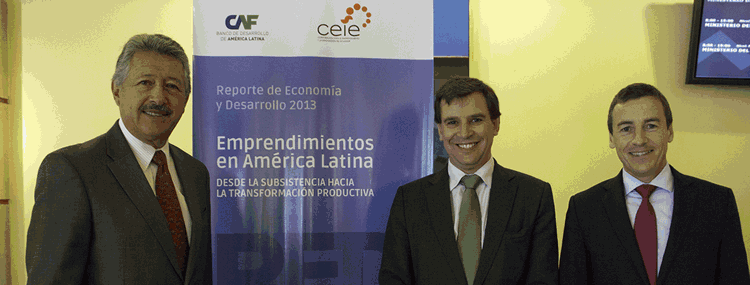
RED 2013 Report Analyzes Situation of Today's Latin American Entrepreneurs
In its 9th edition, the Report on Economics and Development (RED) addressed entrepreneurship. Unveiled by CAF Economist Pablo Brassiolo, the report went up for discussion by expert panelists.
(Quito, Oct. 2, 2013).-CAF-development bank of Latin America- and Ecuador's Corporation for Innovation and Entrepreneurship (CEIE) recently unveiled the 9th edition of its Report on Economics and Development (RED 2013) entitled Entrepreneurship in Latin America: From Subsistence to Productive Change.
The launch and subsequent dialogue on the topic welcomed the participation of government officials and expert panelists, all of whom analyzed today's state of entrepreneurship, its importance and impact on society.
"As an institution committed to sustainable development, CAF welcomes debate and analysis involving different stakeholders to arrive at a better understanding of the role of entrepreneurship in development and productivity in member country economies," said Hermann Krützfeldt, CAF's representative director in Ecuador.
CAF Chief Economist Pablo Brassiolo, who hosted the event, stressed that the report was the product of official data and results from a survey conducted in 17 cities across the region, which found that Latin America boasts a high rate of entrepreneurship among its workforce, however, 75 percent of the region's entrepreneurs are micro-entrepreneurs with less than five employees, many of which are one-man shows.
These results illustrate a noteworthy contrast between Latin America and more developed countries; the region's companies are smaller, and few can boast high growth potential.
Brassiolo concluded his presentation by stressing the importance for both the public and private sectors to collaborate to develop ecosystems that cultivate and nurture entrepreneurships that can adapt to today's Latin American realities via the creation of effective public policies.
Forum
Panelists from different sectors of the economy addressed the report, including David Molina, Ecuador's Deputy Production Coordinator; Guido Caicedo, Professor at the Escuela Politécnica del Litoral; Enrique Mota, General Director of Aymura Capital Estratégico, and Fernando Moncayo, Director of the Asiam Business Group.
The meeting addressed the need to differentiate subsistence and dynamic entrepreneurships, the latter identified as a source needed to improve national productivity. Productivity received a great deal of attention as well, with panelists concluding that the greatest difficulties lie in creating and linking entrepreneurs in the trade and service sectors of the economy as well as supplying those industries with innovative, entrepreneurial talent to create added value.
Methods of capitalizing on research and entrepreneurial experience served as another topic of discussion as well as ways to demystify success stories.
Ecuador's Production and Industries Minister Ramiro González concluded the event by emphasizing that small and medium-sized business must play a crucial role in crafting development and competitiveness strategies alongside the need to create new financing models as well as cutting red tape and associated costs required to start up companies.
Partnership for Entrepreneurship and Innovation in Ecuador
As part of the event, CAF's representative director in Ecuador Herman Krützfeld and Chairman of the Board of Ecuador's Corporation for Entrepreneurship and Innovation Camilo Pinzón signed an agreement, whereby CAF will join the "Alliance for Entrepreneurship and Innovation in Ecuador" project.
CAF will support the alliance - which strengthens efforts designed to train entrepreneurs - by promoting private-public dialogue and by generating information with opportunities to start up or innovate new businesses and by implementing "innovative challenges" to integrate the public, private and academic sectors.
To see the network 2013 click here.
To view the Focus América Latina summary, click aquí.
CAF's more recent content

CAF, ECLAC, IDB and PAHO Promote Sustainable Development in the G20
The Regional Organizations of the Americas congratulate Brazil on its successful G20 Presidency, highlighting its leadership on key issues such as poverty, governance, and climate change. They also reaffirm their commitment to actions that promote equity and development in the region.
Urgent Call for Action to Safeguard Caribbean SIDS at CAF Symposium
As the global community grapples with the escalating climate crisis, Caribbean Small Island Developing States (SIDS) are running out of time to secure critical investments and support needed to strengthen their economies and protect vulnerable communities from the intensifying impacts of climate change. With the window to take decisive action rapidly shrinking, CAF - Development Bank of Latin America and the Caribbean, in partnership with the Commonwealth Secretariat and the Antigua and Barbuda High Commission, brought together key stakeholders for a symposium in London to address the critical vulnerabilities Caribbean SIDS face.